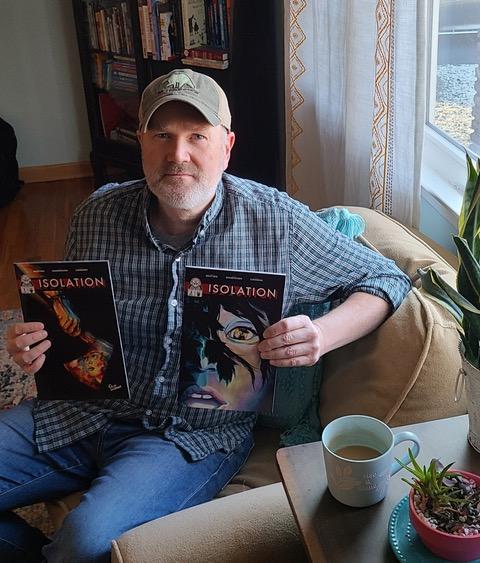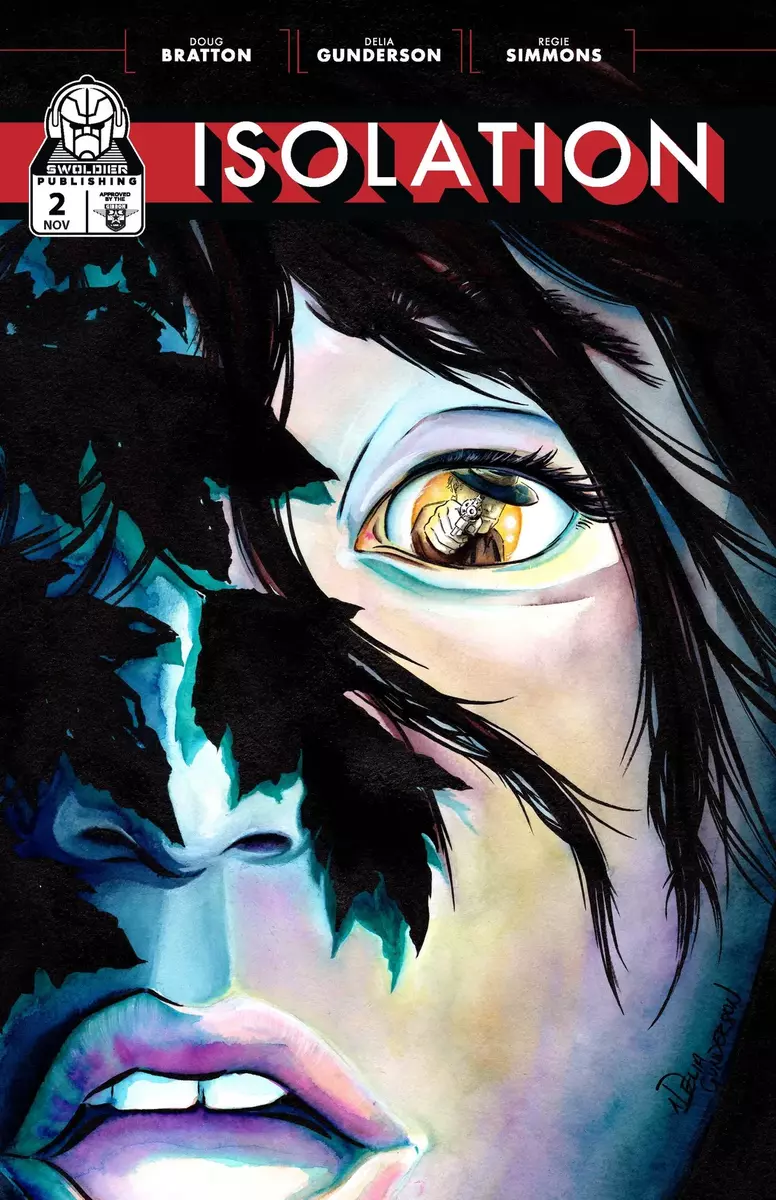
An interview with the author of the Isolation series
Doug Bratton
by Stacey Zering
One of the buzzworthy indie comics of last year was Isolation from rookie publisher Swoldier Publishing, a unique murder mystery that spans various time periods. The man behind Swoldier Publishing is YouTube star Regie Collects, who brought together writer Doug Bratton and artists Delia Gunderson and Elena Morton for this intriguing graphic novel. Bratton discussed the story behind the story of Isolation.
• •
Where do you think Isolation, in terms of genre, fits into the diverse world of indie comics right now?
At its core, Isolation is a mystery. It isn’t a classic “whodunnit,” but there are many questions that need answering, questions that will be answered in due time. There are also elements of horror, fantasy, and history — in small and sometimes large doses.
For those unfamiliar with the series, what is the comic about?
Isolation follows the investigation of a researcher, Mandy Connors, into a secret community that dealt with three years (1869, 1919, 1949) of “mass” murders and killings. That investigation leads to danger, as some want Isolation’s story erased from history. The hidden village ultimately disappears from existence without a trace. What happened? And perhaps more importantly, why did it happen?
When did you decide to become a comic-book writer as a serious pursuit? After all, some consider and may try it, but going forward is not too common.
I have always loved comics, and wrote and drew my first comic book at age 8 with my older brother, Dave. After college (and a considerable amount of effort and rejection), I carved out a respectable side career as a syndicated newspaper and magazine cartoonist. My daily newspaper panel, Pop Culture Shock Therapy, appeared in 50 newspapers (mostly college and alt-weeklies) and was digitally syndicated by Andrews McMeel Universal for several years. You can still pick up a couple of the published collections online. Eventually, I transitioned into writing of all different forms, but comics are my favorite medium.
Did you receive any formal training to write comic books?
Other than 20-some odd years of trial, error, rejection, editor feedback, failures, and successes, no — or maybe that is formal training.
Are there any books you referenced to grasp its structure?
I actively sought out sample comic and movie/television scripts to gain a better understanding of structure and content. Some are reprinted in comic trades and books, some you can find on the internet. There really is no uniform industry standard. The comic writer Fred Van Lente published an excellent format that he created in MS Word that I still use. But a comic script written by Alan Moore is quite different from “the Marvel way,” so I can’t say one format is the right format. Ultimately, I feel like I’m writing my script for an audience of two: my art team and editor. If they “get it” and the artist gets a clear vision, then the comic should translate for readers. My art team (Delia Gunderson, Elena Morton, Chase Cowan, Beth Sharland, and various cover artists) and editor/publisher (Regie Simmons, aka “Regie Collects”) are true collaborators in storytelling.
Growing up, which comic-book writers ignited your imagination the most?
The New Teen Titans by Marv Wolfman and George Perez first hooked me. Wendy and Richard Pini’s ElfQuest and Matt Wagner’s Mage opened a whole new world of non-superhero, independent comic books that kept me reading comics. Outside of comics, I have to give Lloyd Alexander’s Prydain Chronicles a big nod. Before I read those books, I was a kid who really disliked reading. After reading The Book of Three, I became an avid, lifelong reader, and someone who wanted to be a writer.
As an adult, though, which comic-book writers played an integral role in influencing your style?
I am an avid reader, and my writing is influenced by comics, traditional novels, and a healthy dose of non-fiction. I would say that Alan Moore and Neil Gaiman, particularly “The Sandman,” at the very least demonstrated the depth, artistic merit, and overall quality a comic book could achieve. I wouldn’t say my writing style is overtly influenced by their styles, but my thought of ever trying to attempt something as complex as Isolation was certainly impacted by reading their work as an adult.
Are you pleased with the reception Isolation has received thus far? What surprised you the most in terms of feedback?
I am pleased with the reception, very much so! I feel fortunate that we’re three issues into the series, and I turned in my fourth issue script. It is humbling to watch a small but mighty fanbase develop — the readers’ reception is the only reason Isolation made it past issue one.

I’m not sure I would say I’ve been surprised by any feedback yet — Isolation is not a traditional superhero comic and its story and timeline aren’t simple ones, so I knew there would be people who weren’t into it, and people who crave this kind of comic. I would say the most gratifying feedback is when readers reach out with theories about where they think the story is heading. The fact that they are so engaged with the mystery is wonderful.
I guess maybe the one thing I didn’t anticipate fully is how much the cliff-hanger endings of each chapter get the reaction of, “No! What happens next?! I don’t want to wait months for the next installment!” That has been fairly common, and I definitely get it. The nature of rolling out Isolation issue by issue as a comic book series allows it to build a following, but the readers aren’t waiting [only] a week like they would on, say, a streaming series. I sometimes feel a bit guilty that I know the answers to their questions, but they don’t — and they have to wait a while.
What is your process in writing an Isolation script?
A very unusual one. From working in the world of comics, I know how hard it is to get a new series (particularly an ongoing one) greenlit. So after writing a pitch and issue-one script, I shelved it in favor of drafting the first book of Isolation as a novel. My thought process was that it was much more likely to get traditionally published than picked up as a comic book series. Oddly enough, during my rewrite of the novel (and without ever pitching it to an agent), an amazing opportunity to pitch it directly to Regie Simmons, who was launching Swoldier Publishing, presented itself. Back to the process… I adapt each script from the draft novel and will continue to do so if we get through the first book (three acts/trades, 12 comic issues). If Isolation has legs and we get to do books two and three, which complete the entire story, I’ll be writing scripts directly from a scene-by-scene outline I’ve written, which is a more traditional way of scripting comics, I would think. I’ve never heard of another comic book writer starting with a draft novel, and I wouldn’t necessarily recommend it from a time commitment perspective!
When did your creative and business relationship with Swoldier Publishing begin?
I started working with Regie (the founder/owner/publisher) writing blogs for his website on comic collecting. From there, we co-wrote a book, Regie Collects Guide to SMART Comic Collecting, which was very successful. That served as a launching pad for Swoldier Publishing.
Regie is a truly driven individual who dreams big and will work hard to make that dream a reality. He loved Isolation, understood the vision of what it could be (as a comic series and beyond, as intellectual property for other media), and how different it was from other comics in the market. He knew it was a big risk to launch an ongoing series, and he took a chance: on Isolation, on me, on our artists, and on himself. I am forever grateful to have Regie as my partner in this wild ride that has been the launching of this comic-book series. And I believe this is only the beginning. Stay tuned for the next chapter of Isolation!
• •












